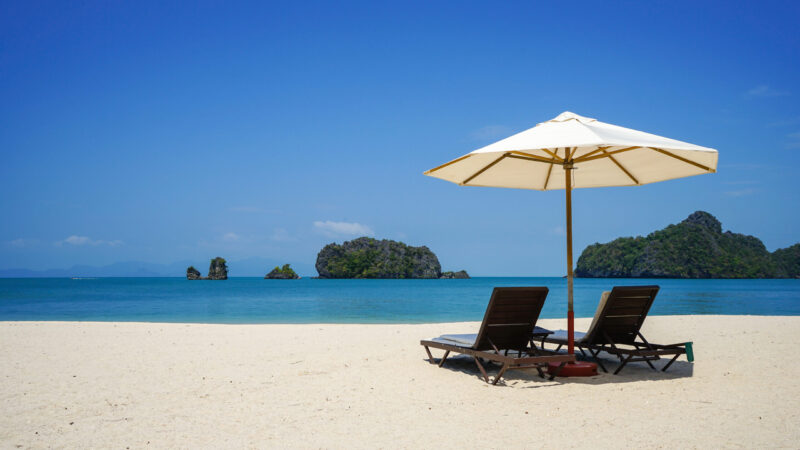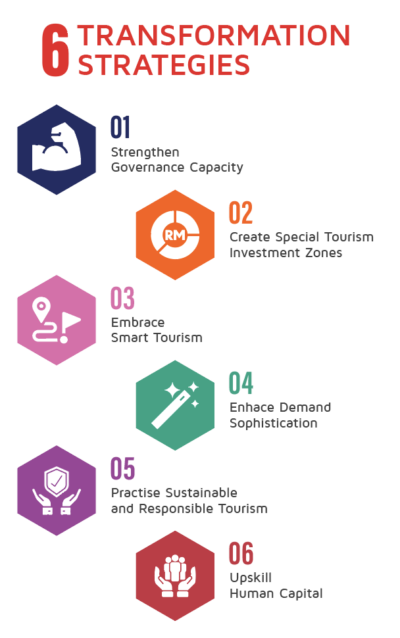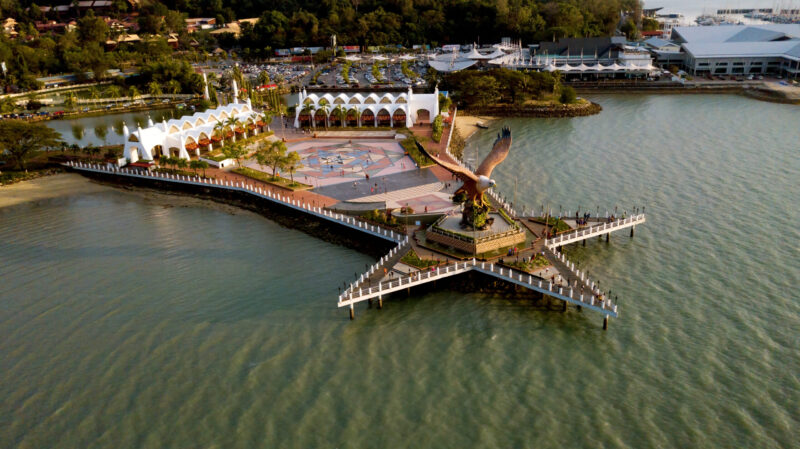
This site
is mobile
responsive

Globally, countries are still experiencing a decline in tourism expenditures. The United Nations World Tourism Organisation (UNWTO) World Tourism Barometer shows that the number of tourist arrivals recorded in 2020 was 399 million people compared to 1.47 billion people in 2019, a decrease of 74.0 per cent.1
Domestic Tourism
Malaysia has not been exempted from this downward trend, as international borders remain partially closed. The Covid-19 pandemic resulted in a decrease of 83.4 per cent of inbound tourists in 2020. Tourist arrivals to Malaysia only came in at 4.3 million people compared to 26.1 million people in the previous year.2
Nonetheless, Malaysia is among the countries with the highest percentage of fully vaccinated individuals in the world, with 98 per cent of the country’s adult population and over 78 per cent of the national population having completed their vaccination doses. This is expected to play a role in reviving the tourism industry as the willingness to travel increases.3
Local tourism resumed shortly after the country ended its multiple lockdowns indicating that the demand for domestic travel will continue to grow and will recover relatively fast because of the growing in-country spending. Seasoned vacationers who are unable to travel abroad are diverting their money locally.
The disruption in demand caused overall internal tourism consumption in 2020 to plummet by 71.2 per cent compared to a growth of 6.8 per cent in the previous year. However, domestic tourism continues to play a significant role contributing 73.8 per cent to internal tourism consumption.4
2022 a Turning Point for Inbound Tourism
According to the UNWTO Panel of Experts, 61 per cent of tourism professionals see better prospects for 2022. While 58 per cent expect a rebound in 2022, (mostly during the third quarter), only 42 per cent foresee a potential rebound in 2023. Most experts (64 per cent) now expect international arrivals to return to pre-pandemic levels in 2024 or later, up from 45 per cent in an earlier survey.6
As domestic travel is keeping the Malaysian travel sector afloat, the industry needs to reinvent itself while waiting for international tourism to resume. Therefore, it is timely for the government to introduce new policies to revive the industry.
National Tourism Policy 2020-2030
In response, the Government launched the National Tourism Policy (NTP) 2020-2030 on 23 December 2020 to ensure the continuity of the country’s tourism industry, while targeting to make Malaysia a global top 10 tourism destination in both arrivals and receipts.
Key approaches in achieving the NTP’s agenda are harnessing public-private sector partnerships and embracing digitalisation to drive innovation and competitiveness towards sustainable and inclusive development in line with the Twelfth Malaysia Plan (12MP), National Ecotourism Plan 2.0 and the 17 United Nations Sustainable Development Goals (UNSDGs).
The policy would be implemented through six (6) main strategic thrusts, including the transformation of governance, creating an inclusive tourism investment zone, and intensifying digitisation in the tourism sector.
In addition, the core thrusts involve enriching tourists’ experience and satisfaction, strengthening commitment to sustainable tourism and increasing human capital capacity in all tourism sub-sectors.7

Special Tourism Investment Zone (STIZ)
To ensure that the strategic thrusts can be implemented objectively and effectively, six (6) sub-committees have been established. MIDA has been appointed to lead the Investment Sub-Committee.
One of the key objectives of the Jawatankuasa Kecil Pelaburan (JKP) is to develop Special Tourism Investment Zones (STIZ) through public-private partnerships and formulate strategies to attract local and international investors to STIZs which have been identified for the promotion of high-value tourism development. Currently, MIDA and the Ministry of Tourism, Arts and Culture Malaysia (MoTAC) are conducting roadshows to engage stakeholders and authorities throughout Malaysia in identifying potential STIZs.
Essentially, the STIZs aim to enhance Malaysia’s tourism ecosystem. Beyond offering accommodation facilities, other required facilities in STIZs include banking, commercial, logistics, hospitals, and retirement homes.
Public-private partnerships are crucial in transforming Malaysia’s tourism industry and the designation of STIZs will create a pro-investment environment while sending welcoming signals to international and homegrown investors.
The strategy of designating certain areas as special zones to induce private investments is not new and has been used by the Government before. This policy has been highly successful in increasing foreign direct investment, employment and industrial capacity in Malaysia’s manufacturing sector.
Likewise, STIZs will function similarly to existing special manufacturing zones, but focus specifically on the tourism sector. The introduction of STIZs aims to encourage high quality investment in Malaysia’s tourism sector, in line with the transformation strategies of the NTP.
Practising Sustainable and Responsible Tourism
Promoting Malaysia as the next ‘Top of the Mind Ecotourism Destination in the World’, NTP incorporates elements of the UNSDGs.8 The UNSDGs are benchmarks for the sustainable growth of Malaysia’s tourism industry, tourism’s role in promoting inclusive development, and responsible consumption and practices.9
In practising good governance, it is important to ensure a balance between development, protection and preservation of the country’s treasures including the environment, culture and heritage.10 The involvement of the private sector in providing infrastructure and facilities without compromising Environmental, Social and Governance (ESG) concerns is important in developing STIZs.
In the long term, the tourism and hospitality sectors will need to look at structural changes that support the transition to low-carbon practices and sustainability.11 Preparing for alignment with the UNSDG and ESG aspects will encourage hotel and tourism project operators to make more sustainable investments, particularly in clean or green technology.
Embracing Smart Tourism
The Government has pushed for the adoption of digitalisation and innovation among hospitality players to gain a better competitive edge. These include creating virtual experiences, providing flexible cancellation policies and rolling out campaigns that encourage advance trip planning or booking.
Under the NTP, MoTAC in close consultation with industry associations has formulated and implemented the Tourism Recovery Plan (TRP). Through the TRP, MoTAC aims to revitalise domestic tourism by offering more creative and attractive travel packages through digital platforms, as well as incentives and promotions in the form of rebate vouchers, e-vouchers, and cashback through e-wallets and discounts.
Another recovery strategy under the TRP is embracing technologies such as cashless payment, online booking, contactless transaction, and contactless check-in to deliver a secure, seamless and contactless travel experience for tourists in the post-pandemic era.
To support technology-related investments in this industry, MIDA encourages companies to tap onto the Automation Capital Allowance incentive which aims to promote the quick adoption of automation specifically for labour-intensive industries and to spur automation initiatives.
In achieving the objectives of NTP, MIDA welcomes quality investments that involve high value and innovative tourism products and services that align with Malaysia’s environmental policies and legal requirements. MIDA also encourages companies to invest in modern and higher standard infrastructure and facilities to build up the resilience and long term competitiveness of the tourism sector. This is in line with MIDA’s theme for this year, “Rebuilding a sustainable economy through quality investment and strategic investment supply chain development in 2022”.
For more information on the Automation Capital Allowance and other MIDA initiatives under NTP, contact MIDA’s Healthcare, Education and Hospitality Division.

6https://www.unwto.org/news/tourism-grows-4-in-2021-but-remains-far-below-pre-pandemic-levels
7National Tourism Policy 2020-2030, Executive Summary
9National Tourism Policy2020-2030, Executive Summary
10https://www.thestar.com.my/news/nation/2020/12/23/pm-covid-19-caused-over-rm100bil-in-tourism-losses
11https://www.mida.gov.my/wp-content/uploads/2021/03/MIDA-IPR-2020_FINAL_March4.pdf